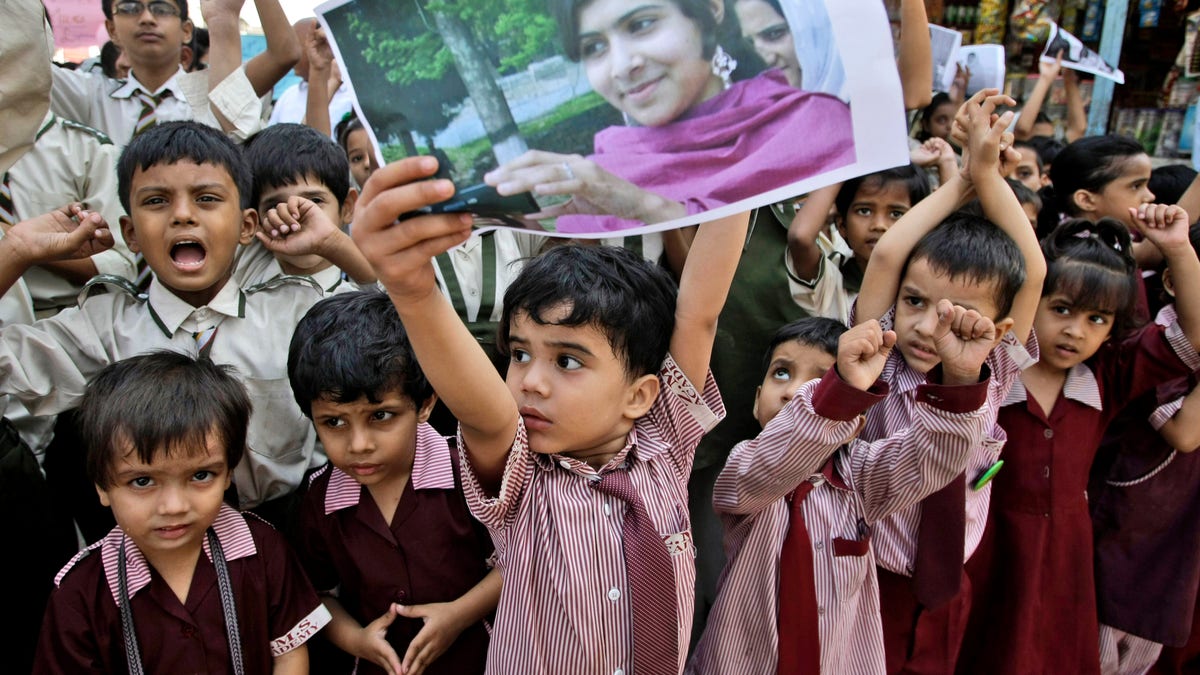
Al Qaeda and the Taliban in Pakistan seem to have been caught off guard by the outpouring of support for Malala. (AP) (AP)
The Pakistani teen who has become a symbol of hope and defiance since Taliban thugs shot her in the head for advocating education for girls touched down in the United Kingdom Monday, where doctors will rebuild her shattered skull.
Malala Yousufzai, 14, who was shot in the head Oct. 9, left Pakistan Monday morning in a specially-equipped air ambulance provided by the United Arab Emirates after doctors in her homeland managed to remove a bullet from her head. She faces more delicate operations and intensive rehabilitation, but may be buoyed by the knowledge that millions in Pakistan and around the world have embraced her as a heroine and martyr. The shooting of Malala and two of her classmates as they returned home from school prompted tens of thousands to rally in support of her in Karachi Sunday. Some Pakistanis have expressed hope that the government would respond to the attack by intensifying its fight against the Taliban and their allies.
“This shooting sends a chilling effect to anyone. If they [the Taliban] can shoot a young girl, then anyone can be a target,” T. Kumar, director of International Advocacy for Amnesty International USA, told FoxNews.com.
[pullquote]
But for now, the Taliban's shocking brutality may achieve its objective.
“This united the majority of Pakistani people," Kumar said. "[But while they] are angry as individuals, families will be less likely to send their children to school, especially the girls.”
Sunday’s response pales in comparison to the tens of thousands of people who held violent protests in Pakistan last month against a film produced in the United States that denigrated Islam's Prophet Muhammad.
Demonstrations in support of Malala -- and against rampant militant violence in the country in general -- also have been fairly small compared to those focused on issues such as U.S. drone attacks and the NATO supply route to Afghanistan that runs through Pakistan.
Right-wing Islamic parties and organizations in Pakistan that regularly pull thousands of supporters into the streets to protest against the U.S. have less of an incentive to speak out against the Taliban, say experts. They share a desire to impose Islamic law in the country -- even if they may disagree over the Taliban's violent tactics.
“There is already a climate of fear in Pakistan. People are often afraid to speak out against things like girl’s education and blasphemy laws,” John Sifton, Asia advocacy director for Human Rights Watch, told FoxNews.com. “The fear level is that much higher, but the flip side is that condemnation of the attack has been high. Pakistanis of all different stripes are speaking out.”
“The idea of settling a dispute with a bullet is something that Pakistanis find to be wrong," he added. "Even those who disagree with the notion of education for girls feel that shooting someone, especially a young girl, because you do not agree with her is something most Pakistani’s find disgraceful.”
The Muttahida Quami Movement is the political party that organized Sunday's rally in Karachi. The party's chief, Altaf Hussain, criticized both Islamic and other mainstream political parties for failing to organize rallies to protest the attack on Malala.
"Malala Yousufzai is a beacon of knowledge. She is the daughter of the nation," Hussain told the audience by telephone from London, where he is in self-imposed exile because of legal cases pending against him in Pakistan. His party is strongest in Karachi.
Hussain called the Taliban gunmen who shot the girl "beasts," and said that the incident was an attack on "the ideology of Pakistan."
Malala drew the ire of the Pakistani Taliban for publicizing their behavior when they took over the northwestern Swat Valley, where she lived, and for speaking about the importance of education for girls.
The group first started to exert its influence in Swat in 2007 and quickly extended its reach to much of the valley by the next year. They set about imposing their will on residents by forcing men to grow beards, preventing women from going to the market and blowing up many schools -- the majority for girls.
Malala wrote about these practices for the BBC under a pseudonym when she was just 11 years old.
The Taliban was pushed out of the Swat Valley in 2009 by the Pakistani military, and the young activist became even more outspoken in advocating for girls' education. She appeared frequently in the media and was given one of the country's highest honors for civilians for her bravery.
The Pakistani Taliban said it carried out the shooting because Yousufzai was promoting "Western thinking." Pakistani police have arrested at least three suspects in connection with the attack, but the two gunmen who carried out the shooting remain at large.
The Associated Press contributed reporting to this story.
